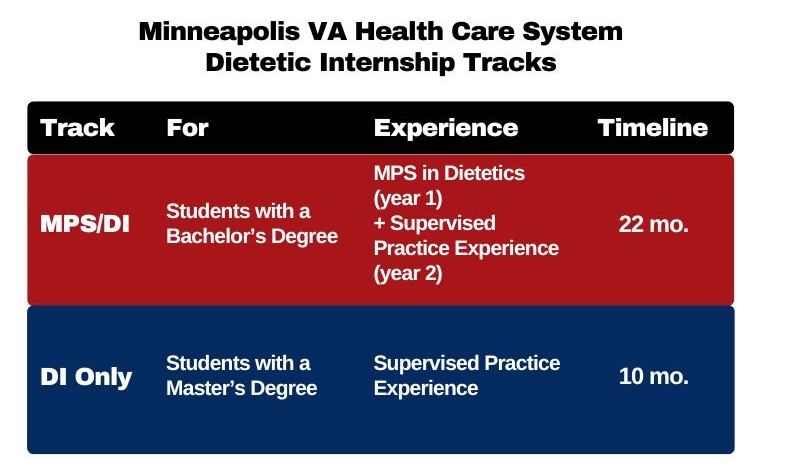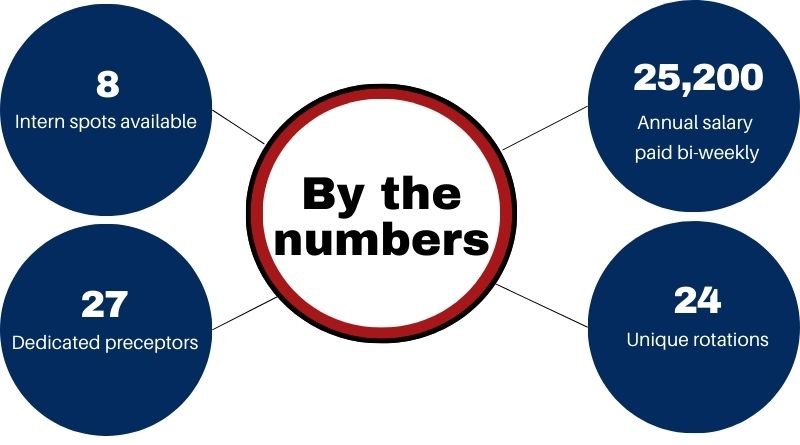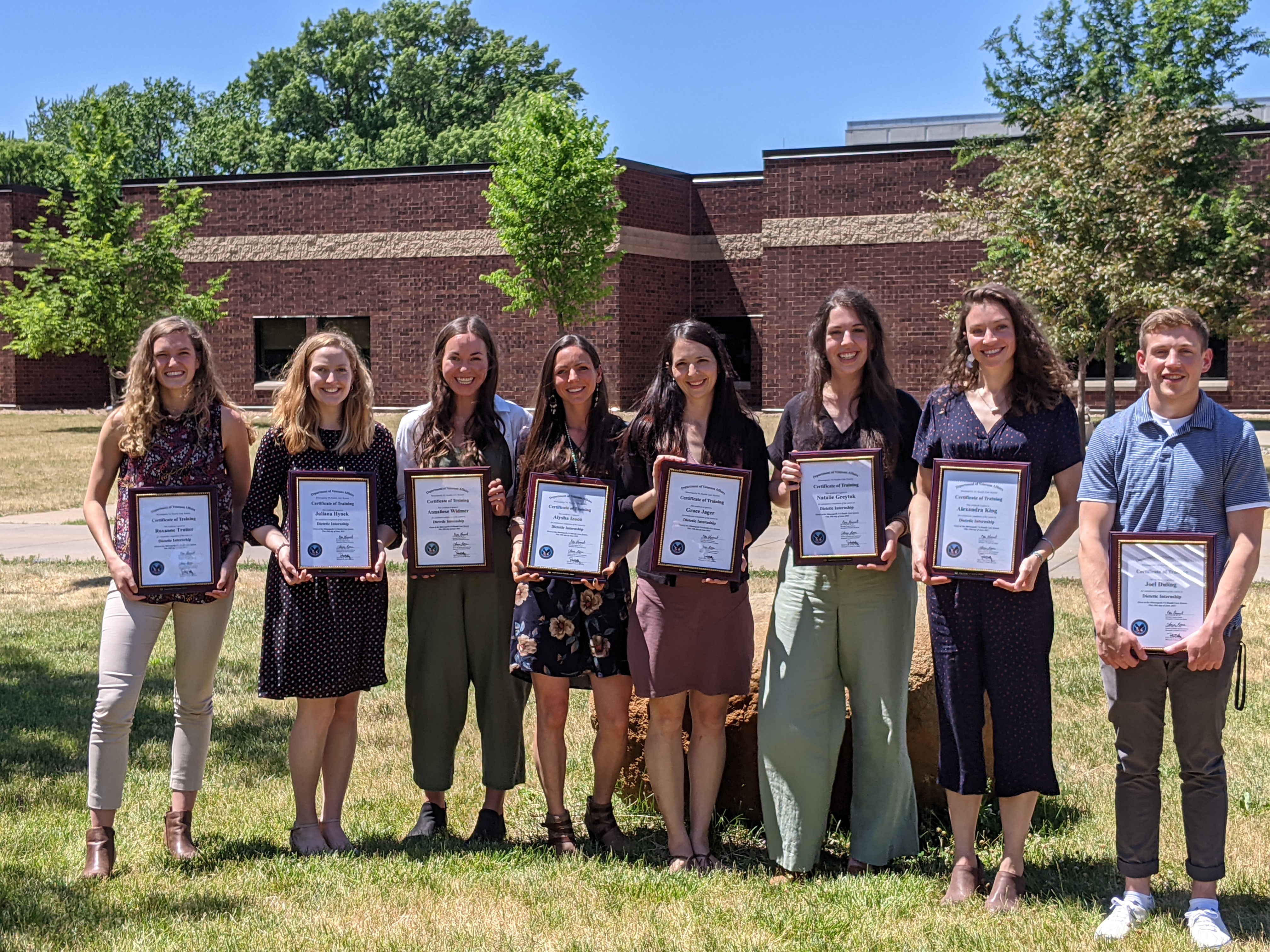Minneapolis VA Healthcare System
The internship has 2 tracks, as below. For either track, the program provides 1500 hours of rotations in clinical dietetics, food service management and community nutrition.

MPS/DI Track
This track provides a Master’s of Professional Studies (MPS) in Dietetics in year 1 in partnership with the University of Minnesota Twin Cities, and a complete and comprehensive supervised practice experience in year 2 (late Aug-June), allowing for a dietetics student with a bachelor’s degree to complete both their Graduate Degree and dietetic internship in 22 months. Acceptance into this track will guarantee a spot in the internship class in the fall class of the following calendar year, providing MPS degree is obtained.MPS Degree
The Dietetics MPS is a one-year, terminal, coursework-only master's degree that prepares students for a career as a Registered Dietitian. The goal of this program is to provide an efficient path for nutrition students who have met the requirements of the DPD program to pursue a master’s degree level certification without the necessity of a formal thesis. Graduates are positioned to interpret and communicate evidence-based nutrition concepts to socioeconomically and culturally diverse audiences including content experts, educators, media, patients/clients, and the public. A graduate faculty adviser is assigned. To learn about courses, fees, and how to apply, check out the Dietetics MPS website.
DI Only Track
(and year 2 of MPS/DI)
The DI curriculum is based on the 2022 Accreditation Council for Education in Nutrition and Dietetics (ACEND) Eligibility Requirements and Accreditation Standards for entry level dietitians; the mission, philosophy, goals and objectives of the program and requisite skills and knowledge necessary for entry level dietetic practice.
The curriculum is divided into three major areas: clinical, food service systems management and community and related areas.
- Clinical Experience
The clinical experience is divided to include rotations to give the interns broad based, in-depth experiences in clinical care. In addition to general clinical rotation, interns will rotate through specialty areas, which include renal, diabetes, nutrition support, surgery, Ambulatory Care clinics, geriatric, polytrauma/rehab/SCI and psychiatry for the concentration in MNT. As the intern progresses in the program, more responsibility and increased patient assignments and learning experiences will be planned. During staff experience, interns will be expected to assume full responsibility for the area assigned. - Food Service System Management
The food service system management experiences are planned to give the intern experience in a variety of food service and management situations. In-depth experience involving food service production, staff training, quality assurance and financial management are incorporated. - Community and Other Areas
The community nutrition rotation is planned to give the intern experiences in applying the principles of nutrition to various groups of people in the community environment. Rotations will include experiences with various community programs such as an eating disorders clinic, community agencies, school nutrition programs, and WIC.
Registered Dietitians serve as the main preceptors of the program; however, the supervised practice component of the curriculum shall include experiences with other disciplines including physicians, nurses, social worker, clerks, pharmacists, librarians, occupational therapists, speech therapists, volunteers, etc.
Some unique qualities of our internship include:
- Preceptors: We have a dedicated staff of highly qualified dietitians and a teaching environment that promotes education and evidenced based practice. Our small class size means that you will get specialized, individualized attention. In most rotations, only one intern is assigned to a preceptor at a time, allowing for maximum attention to your learning experience.
- Curriculum: The program is hospital-based with rotations in all areas of medicine, surgery and specialty care. These rotations are supplemented with experiences in the community such as WIC, eating disorders, and public health clinics as well as didactic classes.
- Jobs: We will assist you in finding employment in the government or private sector. With more than 100 VA Medical Centers across the country, you will have increased opportunities to work for the VA.
- Allocation: Interns in our program receive an allocation of approximately $25,200, which is paid throughout the course of the internship.
- Insurance Benefits: Interns are eligible for health, vision, and dental insurance during their time in the internship program.
Internship Graduation Requirements

* Photo of 8 graduates of the program outside the medical center, holding Certificates of Completion.
For more on how to become a registered dietitian, click here. Interns must have their Master's Degree to be able to start the supervised practice portion of the internship. Graduates of the internship receive a verification statement and are eligible to take the Registration Exam for Dietitians once the program is successfully completed.
Intern graduates once the following are completed:
- 42 weeks of practical experience at an entry-level competency
- all assignments and projects by established guidelines
- all post tests, with an 80% passing grade
- staff experience at an entry-level competency
- all classes, workshops, and seminars



















